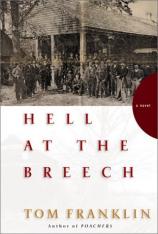Hell at the Breech
Review
Hell at the Breech
In his highly praised short story collection, POACHERS, Alabama
native Tom Franklin mined a neglected topic --- the modern South
--- for narrative gold. He created vivid, visceral stories of
present-day losers and rabble-rousers, and presented them as both
regular frustrated humans and red-dirt legends.
Although his follow-up novel, HELL AT THE BREECH, is set more than
100 years in the past, Franklin's sensibility for gritty Southern
realism remains in tact and in fact has become one of his defining
traits as a regional author. Much like its predecessor, HELL AT THE
BREECH refuses to romanticize the South, its inhabitants, or the
violence they perpetrate, yet Franklin holds up his male characters
as examples and exemplars of various strains of Southern
masculinity, examining the morality of bloodshed in all its
muscular complexity.
So many things work so well in this novel about a real-life gang
war in rural Alabama that it's difficult to know which to praise
first or foremost. Franklin's grasp of history is strong and
confident; he ably recreates not just the language and the customs
of turn-of-the-century Alabama, but also its lost landscape, a
terrain that seems foreign at the turn of this century: "The woods
were high all around, so green it felt almost cloudy, thrashers
noisy in the bracken and sparrows flitting overhead, the ground
slashed like paintbrush work with the shadow of pine
needles."
Evoked in patient, sculpted sentences, the rough, unforgiving woods
--- especially the impenetrable Bear Thicket that separates the
city of Oak Grove from the uncivilized agrarian community of
Mitcham Beat --- lend the story a sense of menace and mystery, and
suggest an ever-changing world that seems impossibly vast.
Introducing one of his main characters, a teenager named Mack
Burke, Franklin writes that "the earth redefined itself around him,
same as it had the day before and the day before that and as far
back as his memory went, as if this dawn were no different than any
other."
That dawn, however, is different for Mack: it's the first sunlight
he sees after becoming a murderer, having accidentally shot a store
owner named Arch Bedsole during a botched robbery. Arch was a
prominent storeowner in Mitcham Beat, and his murder is locally
assumed to be the work of city people trying to exert political
power over the poor country farmers. In reaction, a group of
Mitcham Beat farmers organize a gang called Hell-at-the-Breech to
overthrow the city businessmen who hold liens on every crop in the
area. Leading Hell-at-the-Breech is Quincy "Tooch" Bedsole, Arch's
cousin and a deeply devious man who takes over Arch's store and
indentures Mack to work as a stock boy.
As the Hell-at-the-Breech gang lash out at the farmers who won't
join up and the city people who oppose them, Sheriff Billy Waite
--- pushing 70 and nearing retirement --- tries to investigate, but
finds only farmers too scared or too angry to take the law's side.
Because he doesn't take immediate action, the townspeople see him
as ineffectual, and because he drinks openly, they see him as a
washed-up sot. But for Franklin, Waite's hesitation is a form of
levelheaded mercy that few people in the novel possess or even
recognize.
Waite's steady lawfulness and Tooch's manipulative lawlessness
provide enough friction to ignite the forest between them, but for
Franklin they represent nothing as simple as good and evil or right
and wrong. HELL AT THE BREECH possesses a more complex morality:
Franklin implies that hostility can be a useful tool but becomes
evil when it is thoughtless and pointless, when men commit violence
for its own sake. Both sides are depicted as righteous in their
causes --- the Hell-at-the-Breech gang justified in its own push
for independence, the city people merely protecting themselves from
a threat --- but their violent actions are morally unpardonable. So
many lives are lost, so many homes burned, so many farms destroyed,
but nothing is won.
With HELL AT THE BREECH, Franklin lives up to the promise of
POACHERS and establishes himself as an imaginative, intelligent,
and important Southern writer. More importantly, he looks history
dead in the eye and reveals how the Old South became the New
South.
Reviewed by Stephen M. Deusner on January 22, 2011
Hell at the Breech
- Publication Date: May 1, 2003
- Genres: Fiction
- Hardcover: 336 pages
- Publisher: William Morrow
- ISBN-10: 0688167411
- ISBN-13: 9781402571930





